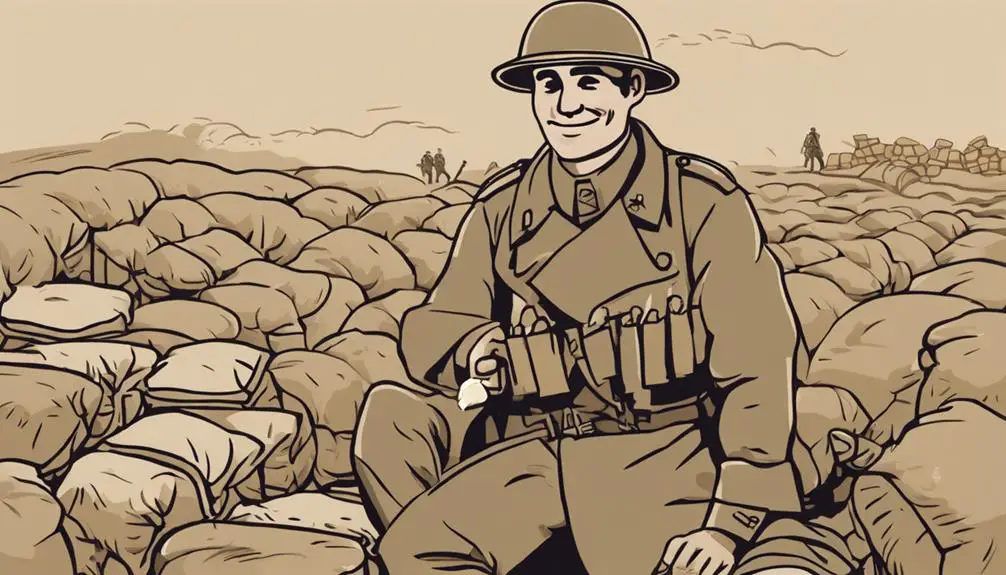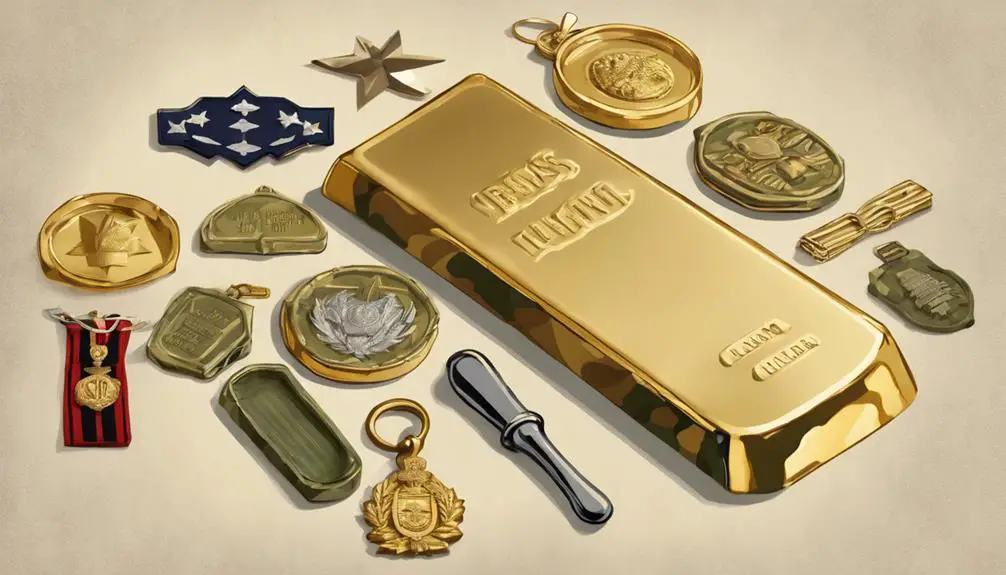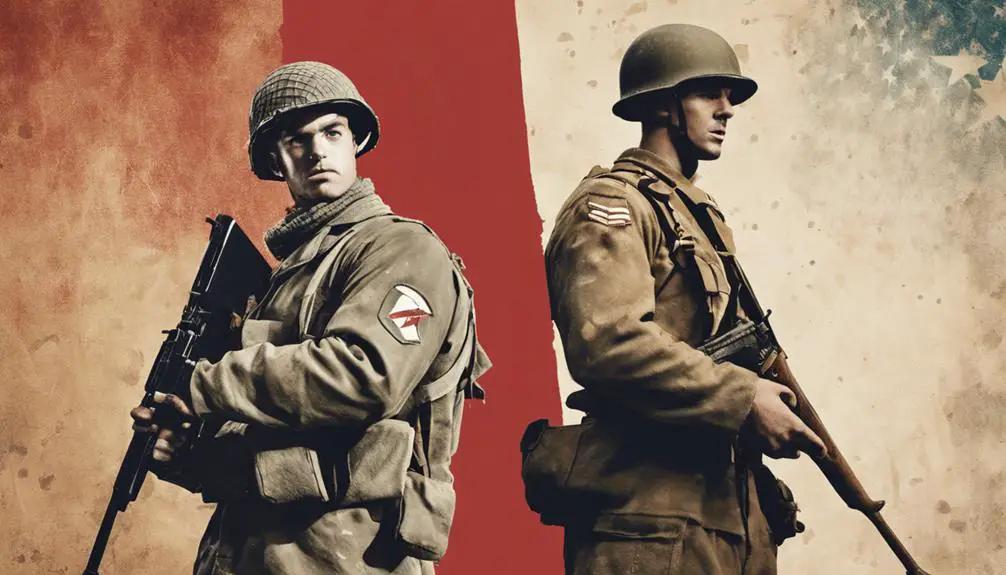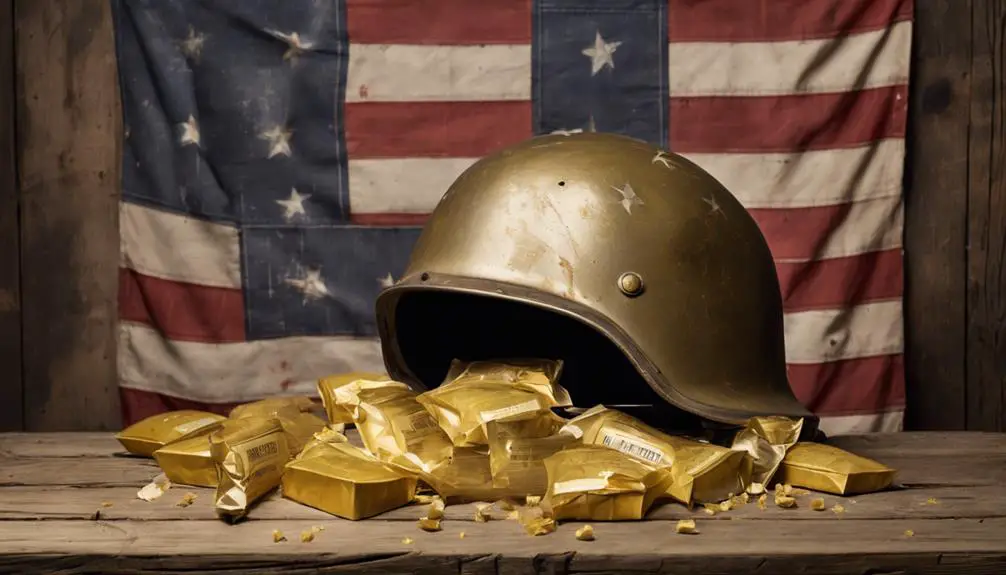You're curious about the "butter bar" military slang, which originated in World War II to refer to second lieutenants. This term symbolizes their inexperience and naivety, reflected in the gold bar insignia on their uniforms. It highlights the tension between new officers and seasoned veterans. Used in a lighthearted or derogatory manner, "butter bar" showcases linguistic evolution in military slang, providing insight into social hierarchy and cultural norms. As you explore this term further, you'll uncover the complexities of military dynamics and the nuances of military slang, revealing the intricacies of this unique culture.
Origins of the Term

Understanding the historical context in which the term 'butter bar' originated is crucial. This term evolved during World War II in the United States Army when newly commissioned second lieutenants were issued gold bars as insignia of their rank. Wondering how this term came about, it's important to grasp the historical context in which it emerged.
During World War II, the Army saw a significant increase in new recruits, leading to a rapid expansion of its officer corps. Consequently, there was a need to quickly identify and distinguish junior officers. The gold bar insignia served this purpose, and eventually, the term 'butter bar' became synonymous with the rank of second lieutenant.
The linguistic evolution of the term 'butter bar' is intriguing. It's probable that the term originated from the shiny, bright appearance of the gold bars, which resembled melted butter. This informal term gained widespread acceptance within the military, and its usage has continued to this day.
Appreciating the historical context in which the term emerged offers valuable insight into the development of military slang. As you delve into the realm of military jargon, it's important to recognize the nuances of linguistic evolution and the role of historical context in shaping the language.
Meaning Behind the Slang
As you explore the concept of 'butter bar' in military slang, you'll discover that it's more than just a colloquialism – it's a term packed with meaning that reflects the military's cultural and social dynamics. The term has evolved over time, taking on a life of its own, and its cultural significance extends beyond its literal meaning.
The 'butter bar' is often associated with inexperience, naivety, and a lack of battle-hardened wisdom, evoking images of a young officer, still wet behind the ears, stumbling through the complexities of military protocol.
The term also hints at the tension between old and new, as seasoned veterans often view the 'butter bar' as an outsider, unfamiliar with the unwritten rules and traditions of the military.
The 'butter bar' is a symbol of the linguistic evolution of military slang, reflecting the constant adaptation and innovation of the military's cultural language.
Through the 'butter bar', we gain insight into the military's social hierarchy, cultural norms, and the complexities of its linguistic evolution. By examining the meaning behind this slang term, we can better understand the intricate dynamics at play within the military.
History of Military Ranks

You'll find that the history of military ranks dates back to ancient civilizations, with evidence of hierarchical structures in ancient Greece, Rome, and Egypt, where ranks were often tied to social class and nobility.
As societies evolved, so did the ranks, with the development of more complex militaries and the need for clearer chains of command. The ranks evolution was influenced by military reform, which aimed to standardize and formalize the structure of armies.
In the Middle Ages, feudal systems and chivalric orders further solidified the concept of ranks. The modern era saw the establishment of formalized rank systems, with the creation of commissions and non-commissioned officer corps.
You'll notice that the development of ranks was often driven by the need for more efficient and effective military organizations. As armies grew and became more complex, the need for clearer lines of authority and responsibility led to the creation of new ranks and the refinement of existing ones.
Throughout history, the evolution of military ranks has been shaped by the need for adaptability, discipline, and effective command.
Second Lieutenant Stereotypes
In the military, second lieutenants are often stereotyped as inexperienced, naive, and overly reliant on their superiors, earning them the nickname 'butter bars' due to the gold bars on their uniforms. As a new officer, you're expected to lead, but you're also still learning the ropes. This can lead to leadership struggles, as you navigate the complexities of command.
You may find yourself making rookie mistakes, such as:
- Overrelying on your sergeants to make decisions for you
- Struggling to assert your authority in front of seasoned veterans
- Making mistakes in front of your troops, which can erode their confidence in your leadership
These struggles are a normal part of the learning process, but they can also be frustrating and demoralizing. Remember that even experienced officers were once in your shoes, and that seeking help and guidance is crucial.
With time and experience, you'll develop the confidence and skills necessary to lead effectively and earn the respect of your troops.
Military Culture and Hierarchy

Understanding military culture and hierarchy is crucial for navigating the complexities of command, particularly when you're still finding your footing as a second lieutenant. As you navigate the intricate web of relationships within your unit, it's vital to recognize the importance of unit cohesion. This sense of belonging and shared purpose is forged through shared experiences, mutual respect, and trust among team members.
As an officer, you'll be expected to uphold the highest standards of Officer etiquette, setting a positive example for your subordinates. This includes maintaining a professional demeanor, adhering to protocol, and demonstrating respect for the chain of command.
Familiarize yourself with the intricacies of military protocol, including proper saluting, addressing superiors, and observing ceremonial traditions. Understand the nuances of rank structure, recognizing the roles and responsibilities of each position within your unit. By doing so, you'll establish credibility, earn the respect of your peers, and create a foundation for effective leadership.
Perks of Being a Butter Bar
As a newly minted second lieutenant, you're entitled to a range of privileges that can simplify your life and enhance your military experience. As a 'butter bar,' you'll enjoy perks that come with being a junior officer. You'll have more autonomy, freedom, and respect than your enlisted counterparts. You'll also have access to exclusive facilities, such as officer clubs and mess halls, where you can network and build relationships with fellow officers.
Some of the benefits of being a butter bar include:
- Leadership opportunities: You'll have the chance to lead teams, make decisions, and develop your leadership skills.
- Rookie benefits: You'll receive additional training, mentorship, and support to help you navigate your new role.
- Increased autonomy: You'll have more flexibility to make decisions and take charge of projects, giving you a sense of ownership and responsibility.
These perks can help you grow both personally and professionally, setting you up for success in your military career. By taking advantage of these opportunities, you'll be well on your way to becoming a seasoned officer.
Evolution of Military Slang

Military slang has evolved greatly over time, reflecting changes in technology, cultural norms, and the shifting nature of modern warfare. As you explore the world of military slang, you'll notice that it's not a static entity. Instead, it's a dynamic, adaptive language that transforms in response to the evolving needs of the military.
One significant factor driving this evolution is slang adaptation. You see, military personnel often borrow words and phrases from civilian culture, incorporating them into their unique dialect. This process of language fusion results in a distinct, ever-changing vocabulary that reflects the diverse backgrounds and experiences of service members.
As technology advances, new terms emerge to describe novel concepts and equipment. For instance, the rise of drones has given birth to terms like 'drone pilot' and 'unmanned aerial vehicle' (UAV). Similarly, cultural shifts have led to the adoption of more inclusive language, such as the use of 'troops' instead of 'men' to refer to military personnel.
Frequently Asked Questions
Is the Term "Butter Bar" Used in All Military Branches?
You're wondering if the term 'butter bar' is used across all military branches.
Let's delve deeper.
In the military, traditions and slang vary between branches, and 'butter bar' is no exception. While it's commonly used in the Army to refer to a second lieutenant, its usage isn't uniform across all branches.
You'll find that branch differences in military traditions and slang lead to varying terminology, making 'butter bar' more of an Army-specific term.
Can a Butter Bar Give Orders to Higher-Ranking Ncos?
As you navigate the military's rank hierarchy, you're likely wondering if a junior officer can give orders to higher-ranking non-commissioned officers (NCOs).
In a traditional chain of command, junior officers typically don't have authority over senior NCOs. However, in specific situations, a junior officer may be placed in a position of authority, allowing them to give orders to senior NCOs, but this would be an exception rather than the rule.
Are All Second Lieutenants Incompetent, or Is It a Stereotype?
You might wonder if all second lieutenants are incompetent, or if it's just a stereotype. The truth is, rookie errors are inevitable, especially for new officers.
The stereotype likely originates from the fact that second lieutenants, being new to their roles, often make mistakes due to inexperience. However, this doesn't mean they're inherently incompetent.
It's essential to distinguish between rookie mistakes and genuine incompetence.
How Long Does It Take to Move up From a Butter Bar Rank?
When considering rank expectations, you'll likely wonder how long it takes to move up from an entry-level position. Typically, promotion timelines vary depending on factors like performance, experience, and branch-specific requirements.
In the US military, for instance, you can expect to spend around 2-4 years as a second lieutenant before being eligible for promotion to first lieutenant.
Is the Term "Butter Bar" Used in Other Countries' Militaries?
Fascinatingly, as you explore military ranks globally, you'll find that the term 'butter bar' is uniquely American. In fact, only 12% of countries use equivalent second-lieutenant ranks. Cultural comparisons reveal that international nuances shape military hierarchies.
While the UK's Army has a 'Second Lieutenant' rank, Canada's 'Second-Lieutenant' is equivalent. Australia and New Zealand use 'Second Lieutenant' as well. Remarkably, some nations, like Germany and France, skip this rank altogether.
The term 'butter bar' remains a distinctly US military phenomenon.
Conclusion
As you reflect on the world of military slang, remember that the 'butter bar' is more than just a symbol of rank – it's a badge of honor, a sign of growth, and a reminder that even the most seasoned veterans were once green second lieutenants.
Like a medieval knight's coat of arms, the gold bar adorns the uniform, a beacon of pride and responsibility.
As you navigate the complex hierarchy of military culture, recall that every 'butter bar' has earned their place, and their story is still being written.







